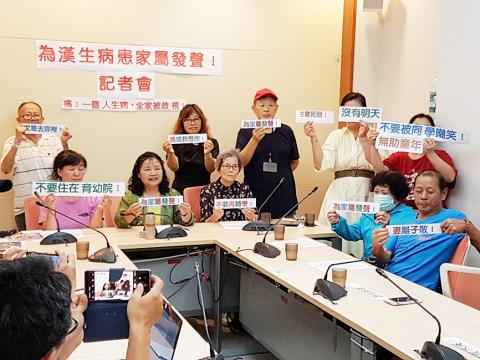The Losheng Self-Help Association and family members of people with Hansen’s disease yesterday urged the government to address the history of leprosy patients in Taiwan after Japanese Prime Minister Shinzo Abe apologized for the Japanese government’s past segregation policy.
Abe last month apologized to families of former Hansen’s disease patients after the Japanese government said it would not appeal a Kumamoto District court ruling ordering it to pay compensation of more than ¥370 million (US$3.5 million) to the families.
Abe’s approach provides an example of what the Taiwanese government could do to improve the treatment of Hansen’s disease patients, Democratic Progressive Party Legislator Chen Man-li (陳曼麗) told a news conference in Taipei.

Photo: Hsieh Chun-lin, Taipei Times
New Taipei City’s Losheng (Happy Life) Sanatorium (樂生療養院), where many Hansen’s disease patients have been treated since the Japanese colonial period, gained public attention in the 2000s due to a government plan to demolish it to make way for a new MRT station, she said.
Today, the MRT station is operational and the sanatorium houses more than 100 residents, she said.
While the legislature in 2008 passed the Rights Protection and Compensation for Hansen’s Disease Patients Act (漢生病病患人權保障及補償條例), the government should also consider taking steps to preserve the history of Hansen’s disease patients, she said.
A Losheng resident surnamed Chu (朱) said she was relocated to the sanatorium during the Japanese colonial period.
Nobody wanted her as a child, but the sanatorium took care of her, she said, adding that her children were born there.
Another resident, who asked to remain anonymous, said she was born in the sanatorium, as both her parents had the disease.
She said she is glad that the Japanese government reviewed its past policy and hopes the issue would receive more attention in Taiwan.
The history of Hansen’s disease patients is not something that can easily be denied, film director Wang Mo-lin (王墨林) said.
Taiwan’s Hansen’s disease patients were segregated according to Japan’s past policy and they deserve an apology and compensation, he said.
Compared with issues such as “comfort women” and other controversies from World War II, Hansen’s disease patients’ request should be much easier to address, he said, asking: “Why has the Executive Yuan not taken any proper action?”

ANOTHER EMERGES: The CWA yesterday said this year’s fourth storm of the typhoon season had formed in the South China Sea, but was not expected to affect Taiwan Tropical Storm Gaemi has intensified slightly as it heads toward Taiwan, where it is expected to affect the country in the coming days, the Central Weather Administration (CWA) said yesterday. As of 8am yesterday, the 120km-radius storm was 800km southeast of Oluanpi (鵝鑾鼻), Taiwan’s southernmost tip, moving at 9kph northwest, the agency said. A sea warning for Gaemi could be issued tonight at the earliest, it said, adding that the storm is projected to be closest to Taiwan on Wednesday or Thursday. Gaemi’s potential effect on Taiwan remains unclear, as that would depend on its direction, radius and intensity, forecasters said. Former Weather Forecast

As COVID-19 cases in Japan have been increasing for 10 consecutive weeks, people should get vaccinated before visiting the nation, the Centers for Disease Control (CDC) said. The centers reported 773 hospitalizations and 124 deaths related to COVID-19 in Taiwan last week. CDC Epidemic Intelligence Center Director Guo Hung-wei (郭宏偉) on Tuesday said the number of weekly COVID-19 cases reported in Japan has been increasing since mid-May and surpassed 55,000 cases from July 8 to July 14. The average number of COVID-19 patients at Japan’s healthcare facilities that week was also 1.39 times that of the week before and KP.3 is the dominant

The Chinese Communist Party’s (CCP) working group for Taiwan-related policies is likely to be upgraded to a committee-level body, a report commissioned by the Mainland Affairs Council (MAC) said. As Chinese President Xi Jinping (習近平) is increasingly likely to upgrade the CCP’s Central Leading Group for Taiwan Affairs, Taiwanese authorities should prepare by researching Xi and the CCP, the report said. At the third plenary session of the 20th Central Committee of the CCP, which ended on Thursday last week, the party set a target of 2029 for the completion of some tasks, meaning that Xi is likely preparing to

US-CHINA TRADE DISPUTE: Despite Beijing’s offer of preferential treatment, the lure of China has dimmed as Taiwanese and international investors move out Japan and the US have become the favored destinations for Taiwanese graduates as China’s attraction has waned over the years, the Ministry of Labor said. According to the ministry’s latest income and employment advisory published this month, 3,215 Taiwanese university graduates from the class of 2020 went to Japan, surpassing for the first time the 2,881 graduates who went to China. A total of 2,300 graduates from the class of 2021 went to the US, compared with the 2,262 who went to China, the document showed. The trend continued for the class of 2023, of whom 1,460 went to Japan, 1,334 went to